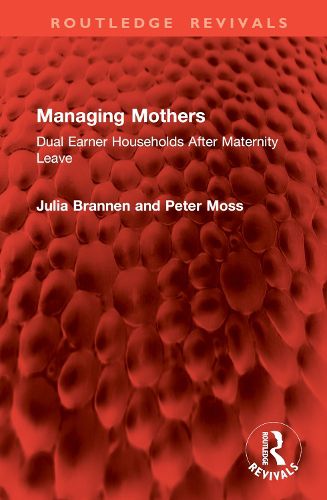Readings Newsletter
Become a Readings Member to make your shopping experience even easier.
Sign in or sign up for free!
You’re not far away from qualifying for FREE standard shipping within Australia
You’ve qualified for FREE standard shipping within Australia
The cart is loading…






First published in 1991, Managing Mothers (now with a new preface by the authors) provides a detailed, authoritative inside story of the lives of parents, and particularly mothers, who return to work after the birth of a first child. It is based on a study of couples who have combined the transition to parenthood with two full-time jobs in the labour market. The authors provide extensive personal accounts from interviews and statistical data that shed light on the experience and significance of this growing social group. They reveal that mothers are the main managers of the dual-earner lifestyle; hence, they are the principal characters in this story as the authors explore women's occupational mobility, their social networks, social and emotional support, and psychological health.
The book exposes a variety of constraints upon women: the continuing power of unsupportive ideologies concerning breadwinning, marriage and family life; the failure of government to organize good quality childcare; the failure of employers to make provisions that would enable parents to fulfil their employment and domestic responsibilities; and the failure of husbands to take an equal share in household work. An understanding of these constraints is essential if the increased need for women in the labour market is to lead to better and more equal employment for women and the removal of the 'double burden' that weighs so heavily on many working mothers. This volume will be a beneficial read for students and researchers of sociology and psychology.
$9.00 standard shipping within Australia
FREE standard shipping within Australia for orders over $100.00
Express & International shipping calculated at checkout
First published in 1991, Managing Mothers (now with a new preface by the authors) provides a detailed, authoritative inside story of the lives of parents, and particularly mothers, who return to work after the birth of a first child. It is based on a study of couples who have combined the transition to parenthood with two full-time jobs in the labour market. The authors provide extensive personal accounts from interviews and statistical data that shed light on the experience and significance of this growing social group. They reveal that mothers are the main managers of the dual-earner lifestyle; hence, they are the principal characters in this story as the authors explore women's occupational mobility, their social networks, social and emotional support, and psychological health.
The book exposes a variety of constraints upon women: the continuing power of unsupportive ideologies concerning breadwinning, marriage and family life; the failure of government to organize good quality childcare; the failure of employers to make provisions that would enable parents to fulfil their employment and domestic responsibilities; and the failure of husbands to take an equal share in household work. An understanding of these constraints is essential if the increased need for women in the labour market is to lead to better and more equal employment for women and the removal of the 'double burden' that weighs so heavily on many working mothers. This volume will be a beneficial read for students and researchers of sociology and psychology.